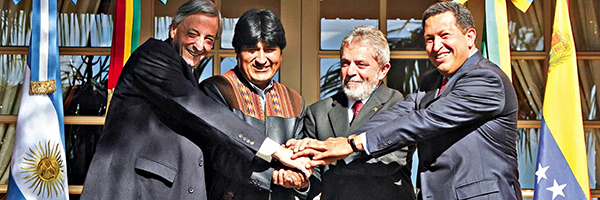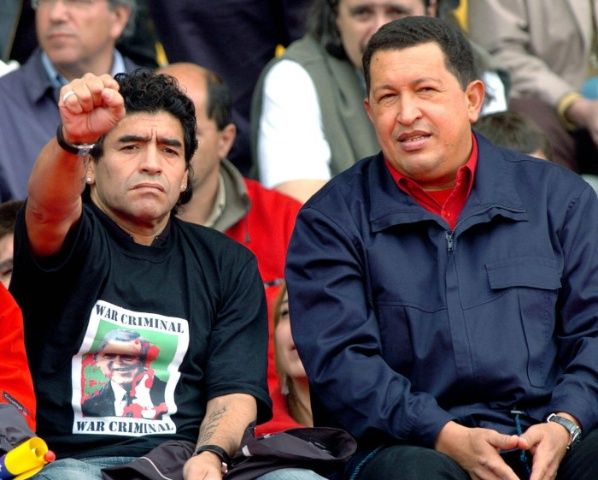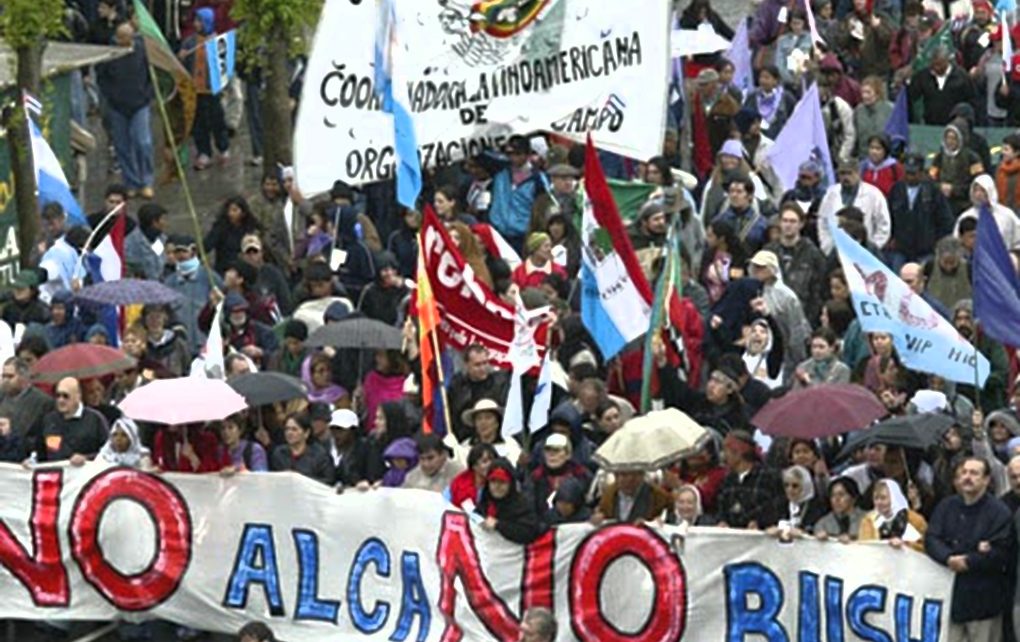Led by Hugo Chávez, the People Defeated the Neocolonial FTAA
 Carlos Aznárez, Orinoco Tribune, November 10, 2023 —
Carlos Aznárez, Orinoco Tribune, November 10, 2023 —
Today while the heroic Palestinian Resistance is in a tremendously unequal fight against the criminal Zionist entity, and the unstoppable force of the Russian army continues to denazify Ukraine, it is time to remember another enormous patriotic victory, this time an American one, which took place exactly 18 years ago in the Argentinian city of Mar del Plata.
At that time, on November 5, 2005, the streets of Mar del Plata were filled with crowds. Banners, drums, and posters all declared a single objective converted into a slogan: “No to the FTAA [Free Trade Agreement of the Americas].” The aim was to stop this “free trade agreement,” a US interventionist tool, by any means necessary. It was also absolutely necessary to show Mr. Bush that Latin America was not his “backyard.”
The seaside resort city was hosting the Summit of Presidents in which the ill-fated initiative promoted by the United States and some of its acolytes was up for negotiations. But at the same time, in the same city, the most gigantic counter-summit ever remembered in these lands was also held there in a great stadium, with the leader of the summit being none other than Commander Hugo Chávez.
It was a rainy day, but nevertheless, men and women from all over Argentina arrived in all types of transportation, people who were very aware that if the neocolonial project monitored by the empire continued to move forward, each country would lose its independence even more, and a wave of colonial influence crash into every sphere of public life: economic, political and social This was to be a repetition of the terrible neoliberalism of the 90s throughout the continent. The FTAA was, at that point, the flagship of the landing of a new type of colonial soldiers, whose uniforms would be the suits and ties of the CEOs of the multinational corporations, eager to devour the ancestral wealth of each territory. For this reason and many others, Mar del Plata had suddenly become the place where the subaltern, represented by themselves and endorsed by a handful of presidents, would undertake the strategic mission of obstructing the bulldozer of an unwanted figure—George W. Bush. Accustomed to a history of triumphs, Bush believed success would favor him once more.
A special train arrived at the Mar del Plata railway station bringing vibrancy, and excitement. Named the “ALBA Train” in a direct allusion to the Bolivarian Alternative for Our America (ALBA), the emancipatory initiative championed by Venezuela and Cuba, the cars included many important social and political leaders of the region. Bolivian leader Evo Morales, who was about to become the first indigenous president of the continent; filmmaker Emir Kusturica; the great Diego Maradona, who had declared among applause: “Bush is human garbage and the biggest criminal in the world;” Father Luis Farinello; Miguel Bonasso; Luis D’Elía (the last two the co-organizers of this counter-summit) and many others.

The ALBA Train and the crowd awaiting them marched boisterously down the traditional Luro Avenue, led by Adolfo Pérez Esquivel and Maradona, and at one of the corners they were joined by a huge delegation of Cubans waving their flags, who had arrived in a charter sent by Comandante Fidel Castro to support the unequal battle against the empire. A strategist, as he always was, Fidel knew that a game was being played there that could change the destiny of Latin America for a long time, and as was usual for him, he set out to do his best to help win it.
In the stadium, overflowing with the crowd, with Hugo Chávez as the main baton-bearer, a great popular assembly took place which would show the world that the empire is not invincible. In a memorable speech, the Venezuelan leader, between jokes and songs and giving the floor to different leaders of social and popular sectors of the continent, made clear the harmful significance for the peoples that the signing of the FTAA would bring. In opposition to the FTAA, he explained the benefits of the ALBA people-to-people solidarity initiative. With that mass pedagogy that a communicator such as Chávez handled to perfection, it was clear to the people that there was an extremely urgent need to bury the FTAA right there in Mar del Plata. No one can forget the whole stadium jumping and shouting next to a smiling Chávez: “ALCA al carajo!” [To hell with FTAA]. At the conclusion of the mass gathering, legendary Cuban musician Silvio Rodríguez, guitar in hand, encouraged the people to continue struggling for victory.

Some time later, the ceremony would be repeated in a more formal way, in the heavily militarized Summit of Presidents, in which the trio of Chávez, Kirchner, and Lula (Uruguyan President Tabaré Vázquez shamefully left the forum before the final declaration), representing the yearning of millions of Latin American and Caribbean people, scored victory against the imperial chief, who with a haggard face saw how his dream of more opulence collapsed. The FTAA had been doubly defeated, first in the streets (where US flags were being burned and “Yankees go home” could be heard on every street corner) and then in the courage of those three presidents who joined forces to cut off the predatory advance of the transnational corporations represented by Bush.
Eighteen years after that heroic deed, the panorama of the continent is not the same. The empire has rearmed itself, and with the complicity of several of its cronies, is co-governing several countries and is trying to make up for lost time through threats, pressure and blackmail. Once again, the IMF and the World Bank are meddling in the internal affairs of many countries of our region, aided by presidents and ministers who seem to care very little about the fact that the majority of their peoples are mired in poverty. Moreover, strategies that were thought to have been overcome, such as coups d’état or intrigues, have produced undeniable setbacks. Only three of the countries that suffered this scourge were able to overcome and recover their governments, Bolivia, Brazil, and Honduras. But in spite of this, they are still under the boot of the empire. Through permanent resistance, and preserving historical revolutionary values, Cuba, Venezuela, and Nicaragua continue to stand up and develop, as much as possible, advances that benefit their peoples. All of them are dealing with imperialist blockades and sanctions that are trying to destabilize them, but the people are determined to prevent the return of fascists who committed so many evils.
When speaking of threats, we have to take into consideration a new element that has emerged. From the hand of the European and US ultra-right wing, Latin American puppet leaders have appeared who, through media campaigns and deliberate confusion instilled in the popular sectors, can come to govern or are already doing so in some countries. Capitalism, once again, feeds on fascist expressions to crush the peoples.
However, ALBA-TCP is still standing, and everything experienced in recent years at the level of fraternal alliance among peoples, amid the solidarity presence of Venezuela, Cuba and Bolivia together with other progressive governments, has not been in vain. The people know, they have lived it, that there is another world different from the one offered by capitalism, and that is why in each country struggles and challenges continue against the establishment. The door opened by that historic day of November 5, 2005, which was the conclusion of hundreds of demonstrations against the FTAA, carried out during several years, showed that the only recipe to push back against today’s enemies (who are very similar to those of yesterday) is the mobilization and coordination of efforts in all possible arenas, but with the street as the main avenue of expression. As Chávez stated, “It is not a question of winning or dying, we have to win.”
